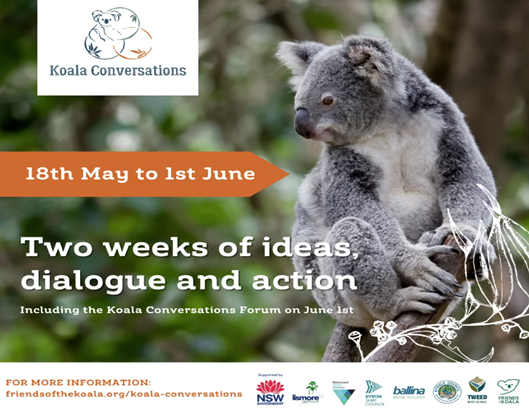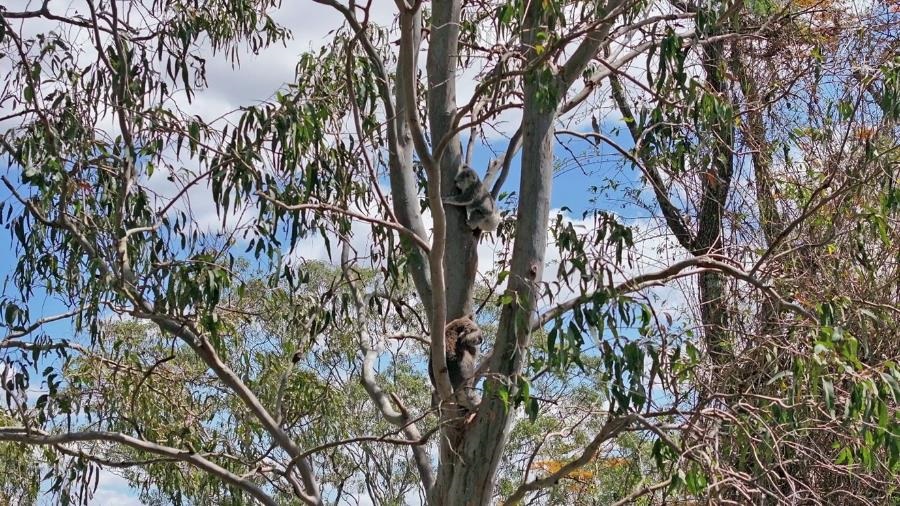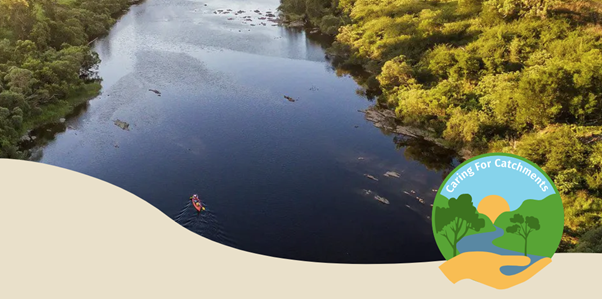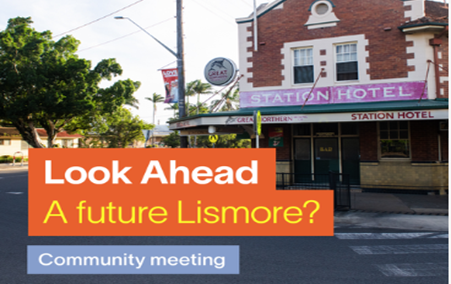Welcome to the Winter Biodiversity Newsletter for 2024! This edition highlights exciting events and initiatives in the Northern Rivers region.
Koala Conversations
Join workshops, tree plantings, field days and online talks in May 2024 to support koala conservation. Don't miss the one-day symposium at Southern Cross University on 1 June.
Caring for Catchments Grant
The North Coast Regional Landcare Network is inviting applications for a grant aimed at enhancing flood resilience and ecological sustainability through native vegetation planting, weed management and community education.
Look Ahead Initiative
Participate in community meetings to co-design a resilient future for Lismore. These sessions will address flood resilience, housing diversity and environmental regeneration.
Upcoming RLI projects kick-off
Read on for exciting information on the upcoming RLI projects for Incorporated groups, kicking off in 2025.

Koala Conversations is happening!
Koala Conversations is a series of events including workshops, tree plantings, field days, online talks and other relevant activities that is being delivered across the Northern Rivers in May 2024. Events have been organised and hosted by a range of organisations across the region.
Access the full program to see what events are happening now.
If you missed some events at the Koala Conversations Festival, you still have the chance to attend the last days, including the one-day symposium at Southern Cross University.
- When: 1 June 2024, 9am to 5pm
- Where: SCU University
The Koala Conversations Forum brings together experts working in the field of koala conservation in the Northern Rivers. Topics will focus on protecting, restoring and creating koala habitat.
Topics include:
- Koala Habitat Mapping
- Chlamydial Vaccines
- Population Monitoring
- Habitat Restoration
- Koalas, Fire and Rainforest
- A Regional Approach to Koala Conservation
See the full forum program

Council undertakes regular three-yearly ecological monitoring of the koala population of Lismore, in line with management activities set out by the Comprehensive Koala Plan of Management for South-East Lismore (CKPoM). The third round of monitoring was completed by Biolink Ecological Consultants over the 2023-24 summer, focussing field survey on the area of the CKPoM and analysing historical koala sightings records across the LGA to explore where they are living and the impact of key threats.
The results show that koalas remain widely distributed across the LGA, with areas supporting long-standing resident koala populations widespread but mostly concentrated in the south and north-east of the LGA. Consistent with previous studies, the main contributors to recorded koala deaths were disease (58%), vehicle-strike (23%) and dog attack (6%). Analysis of koala vehicle-strikes confirmed the location of known blackspots, with no significant change in the number of strikes compared to previous studies.
Field-based survey of koala occupancy and activity levels within the CKPoM area yielded high activity levels. Results indicate that ~88% of the mapped koala habitat in the CKPoM area is occupied, which is extremely high and may indicate that the current habitat is nearing its limit for supporting koalas. 48 sites had ‘significant’ activity, meaning that koalas are likely to reside at these sites. 41 of the sites surveyed were also surveyed in 2017 and/or 2020, and although there were some changes in activity levels at individual sites, there was no overall change in occupancy or activity levels across the study area.
This study provides a targeted snapshot into the current activity and distribution of the koala population of Lismore, which is one of the most active known in the Northern Rivers. While the Lismore population does not appear to be experiencing the declines being seen in nearby LGAs or across NSW, results suggest that the CKPoM population may have plateaued. This is cause for cautious celebration - but not complacency, for it shines a light on the importance of looking after existing koala habitat and the need to connect and create appropriate new habitat across the LGA.
You can access a plain-language summary of the report and the full scientific report on Lismore City Council's website.

The North Coast Regional Landcare Network is inviting landholders from the Brunswick, Clarence, Richmond and Tweed catchments to apply for the Caring for Catchments Project. This project aims to enhance the capacity in the Northern Rivers region to implement nature-based measures on a large scale. The goal is to assist with flood mitigation, improve resilience to flooding, enhance catchment health and contribute to economic and ecological sustainability.
The project aims to plant up to 240 hectares of native vegetation along eight kilometres of cleared rivers and stream banks within the next three years.
This project is made possible by the Australian Government through the Northern Rivers Recovery and Resilience Program 2022-23 administered by the NSW Reconstruction Authority.
To get involved, private landholders, Landcare Networks/Groups, Councils, Environmental organisations, Not-for-profit organisations and First Nations organisations must submit an expression of interest.
Eligible activities include:
- Planting native trees and shrubs along waterways to improve water quality, stabilise riverbanks and enhance habitat for wildlife;
- Fencing of riparian areas and providing off-stream watering points;
- Weed management; and
- Knowledge sharing, education and community engagement programs promoting awareness and education about riparian restoration, flood resilience and environmental markets within the targeted catchments – Northcoast Landcare.
See the full details of the Caring for Catchments projects and expression of interest.

- When: Tuesday, June 4, 5pm to 6:30pm
- Where: Lismore Heights Bowling Club
The Living Lab Northern Rivers is inviting residents of Lismore and surrounding areas to participate in the "Look Ahead" initiative — a series of community and expert meetings focused on envisioning and designing the future of Lismore. This event aims to integrate high-level technical expertise with the lived experiences of residents to create a resilient and sustainable town.
Attending this event allows community members to contribute to discussions around nature-based solutions, addressing issues like flood resilience, housing diversity and environmental regeneration. By sharing ideas, participants will help shape future scenarios that reflect local knowledge and values.
The Lismore City Council, supported by the NSW State Government, is developing a Community vision and plan for the future called "Re-imagine Lismore" for the entire Lismore Local Government Area. While independent of the Council's process, the Look Ahead series will provide crucial insights, particularly for the high-risk flood zones of the Lismore CBD and surrounding neighbourhoods.
Join us in June to be a part of this collaborative effort to design a stronger, brighter future for Lismore. Your involvement is essential in creating solutions that truly work for our community.
Registrations are essential. Please register to secure your spot.
Register here
Call to Action: Community and Industry Groups
In October 2024 Council will seek expressions of Interest from incorporated groups that recognize the principles and intent of the Lismore City Council Biodiversity Management Strategy.
This is a new program designed to support coordinated projects across the Lismore LGA. Landholders interested in on-ground environmental projects are encouraged to apply as part of a community group in October 2024. Applicants seeking individual RLI grants will be eligible to apply in 2025.
The Community and Industry Groups program will fund projects aimed at larger-scale strategic outcomes achieved when multiple landholders, neighbours and industry groups work together. Up to $50,000 will be available over three years for on-ground activities such as:
- Geographically connected bush regeneration projects (e.g. neighbours, corridors, etc); and
- Projects with a common theme across the LGA (e.g. koala habitat, regenerative farming, nature-based measures, etc).
Now is the time to start talking with neighbours, industry and Landcare networks about activating your project ideas.
Guidelines will be available soon. Please contact The Rural Landholder Initiative officer on 02 6625 0500 for more details.
For any additional information on the previous articles, don’t hesitate to contact the Environmental Strategies team at Council at environmentalstrategies@lismore.nsw.gov.au or 02 6625 0500.